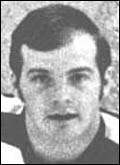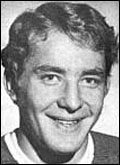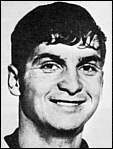Category Archives: 1969 NHL Amateur Draft
Researching the profile for former Colorado College and minor-league star Bob Collyard, a 1969 draft pick of the St. Louis Blues, I came upon an interesting story about a lawsuit that Collyard filed in a U.S. District Court during the late 1970s.
Collyard, who played 10 games with St. Louis in 1973-74 but never made it back to the NHL after that, sued the NHL, several U.S.-based teams, and even the United States government for effectively allowing the NHL and its clubs to discriminate against American hockey players. Another lawsuit filed by Warren “Butch” Williams attempted to make the same case, and the fact that these suits arose at the same time is noteworthy. Obviously, there was a sense among American players that they were not being given a fair shake in the NHL, which seemed far more interested in employing Canadians at the time.
Needless to say, Collyard vs. Washington Capitals and Williams vs. Boston Bruins didn’t get very far as court cases. In fact, they were both dismissed by a U.S. District Court in Minnesota on the same day. Legally, there was no grounds for a lawsuit, and it’s ridiculous to assume that there was an organized conspiracy against non-Canadian players.
No, this issue didn’t belong in a courtroom, but it is fair to say that it was very, very tough for American hockey players to reach the NHL in the 1970s. Many of the U.S.-born players from that era tell stories of being harassed by Canadians, who felt they were simply better at the sport. History has shown that USA Hockey can hold its own, and the potential discrimination long since faded away, but in the 1970s, it was probably very palpable.
Here’s what I wonder. Recall how violent hockey was in the 1970s. Recall that the product the NHL was selling was at least in part embraced because of that violence. Recall that Canadians were developed in leagues where fighting was tolerated, while Americans came up through high schools and colleges where fighting was strictly prohibited. Thus, there likely was a belief that the marginal American players were less inclined to cater to the rough stuff or drop the gloves. This might have made them less useful than their Canadian counterparts, even if they could skate and shoot the puck with more skill.
Again, not an organized conspiracy, but a reality of the era. Consider that the movie Slap Shot is widely recognized by hockey players of that era as coming very close to what life was like. At its heart, Slap Shot was a movie about a college player who didn’t fit into the pro lifestyle. Perhaps Boston-born Ned Dowd, the player on whose experience Slap Shot is based, felt a sense of discrimination from the Canadians of his day. Perhaps the Hanson Brothers — who are not just violent but crazy — are ironically shown the only Americans capable of fitting into such an environment, even though their hockey talent level is questionable at best.
Taking this issue to court was a bit much, but the mere existence of these cases is a reminder of what the NHL was like in the 1970s and reflect a very real sense within these players that they were not being given a chance because they came from south of the U.S.-Canadian border.
I just finished researching and writing the profile page for Brian “Spinner” Spencer. It’s hard to believe he has been dead for more than 26 years, because I remember when he was killed in the summer of 1988. News of his death appeared on the same Hockey News cover as a story about the Edmonton Oilers’ fourth Stanley Cup championship. Wayne Gretzky and Janet Jones, who were about to make some news of their own that year, were on the cover right there with an inset photo of Spencer and a headline that read “Spencer Gunned Down”. I remember that issue of The Hockey News well.
Anyone interested in Brian Spencer’s life beyond what I have in his HDC profile should read the 1988 book “Gross Misconduct: The Life of Spinner Spencer” or watch the 1993 TV movie based on the book. The film has a slightly different name — “Gross Misconduct: The Life of Brian Spencer”.
Brian Spencer’s life was tragic pretty much from start to finish. He was born into a very poor family that lived in central British Columbia. His father obviously had some anger management issues, which led to his death in 1970 — a big part of the Spencer story. Brian Spencer also had a twin brother named Byron, but it was Brian who was pushed by his father to be a hockey player, even though there was no organized hockey for him to play in his part of Canada.
Spencer’s father helped teach him to play the game well enough to walk onto a major-junior league team as an 18-year-old. He proved good enough there to be drafted by the Leafs and then to make it to the NHL, playing for four teams over the course of 10 seasons. That was the high point of his life. He struggled to adjust to retirement and live his last nine years in Florida, where he was charged with murder, acquitted, and then eventually murdered in a random act of violence less than a year later.
Spencer was not a goon. He was a hard-working player and a great teammate by all accounts. He was the Unsung Hero of a Buffalo team in 1975-76 that had its share of great players. He had a fairly long NHL career and was always popular with fans — the first fan favorite in New York Islanders history, in fact. But he was haunted by demons, and those demons eventually caught up to him. If anything, playing hockey was an oasis for Spencer, who didn’t even realize how much his fans loved him even after he retired.
Nobody should have to die at the age of 38, and certainly not at the wrong end of a loaded gun wielded by a complete stranger. Hockey gave Brian Spencer something to live for, something he could not replace after he was no longer able to play the game at its highest level. If he had been able to make that transition more smoothly, he might still be alive today.
Watching today’s players and those yet to come, it’s important to care about them as human beings and not just hockey players. Their careers are relatively short, and they will have many years to face after the cheering stops. Regardless of how well they are paid or how much fame they attain, when they step outside the arena they are all just as human and vulnerable as anyone else. Brian Spencer’s short life will always be proof of that.
Today’s research included a look back at the all-too-brief career of Pittsburgh Penguins center Michel Briere, one of only two Penguins players (along with Mario Lemieux) to have had his number retired.
Briere’s number is retired in memory of his one remarkable season with the Penguins in 1969-70. He was the team’s top rookie and scored the first playoff series-clinching goal in Penguins history. Everyone who saw him play swears he would have been an NHL superstar, and his huge numbers in junior, along with the fact that he jumped right to the NHL, suggest that was definitely the case.
I won’t go into the details of his story here, but you can find them on his HDC profile page. It’s very tragic, to say the least. This is the kind of research I don’t enjoy doing because it involves such sadness.
The other detailed bio posted today was for former All-Star goaltender Gilles Gilbert. A true playoff hero for the Bruins — even if he didn’t win the Stanley Cup — Gilbert was a very solid goalie whom I remember well from my earliest days as a hockey fan. He also holds a very impressive NHL record — most consecutive wins.
But there is a big problem with Gilbert’s record: It’s extremely misleading. When you see that record in the books, you assume Gilbert won 17 consecutive starts during the 1975-76 season. That wasn’t the case. Gilbert received wins in 17 consecutive decisions. This is very different from winning 17 straight starts, because Gilbert actually started 19 games during his “streak” and was pulled from the net in one of them. He got hurt in the other game, but his replacement got the decision (a tie). In the game when he was shelled — and should have lost his streak — the Bruins came back to tie it, and Gilbert’s replacement took the eventual loss. So the truth is that Gilbert holds an NHL record for consecutive victories, but not for victories in consecutive starts. The NHL should seriously consider revising this entry in the Guide and Record Book.
You can read the story of Gilbert’s somewhat dubious streak on his profile page.



